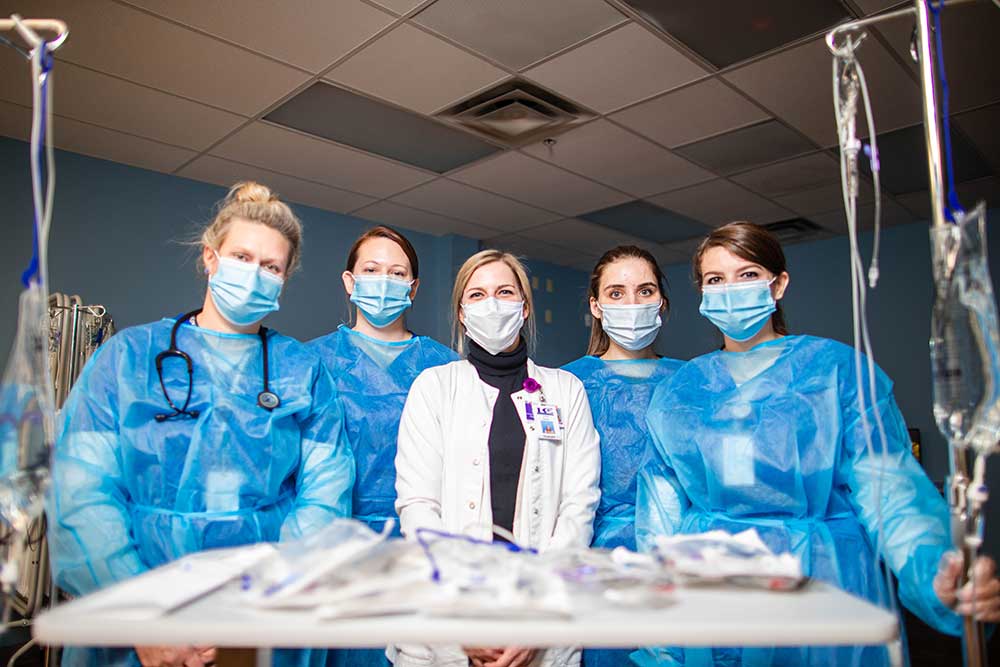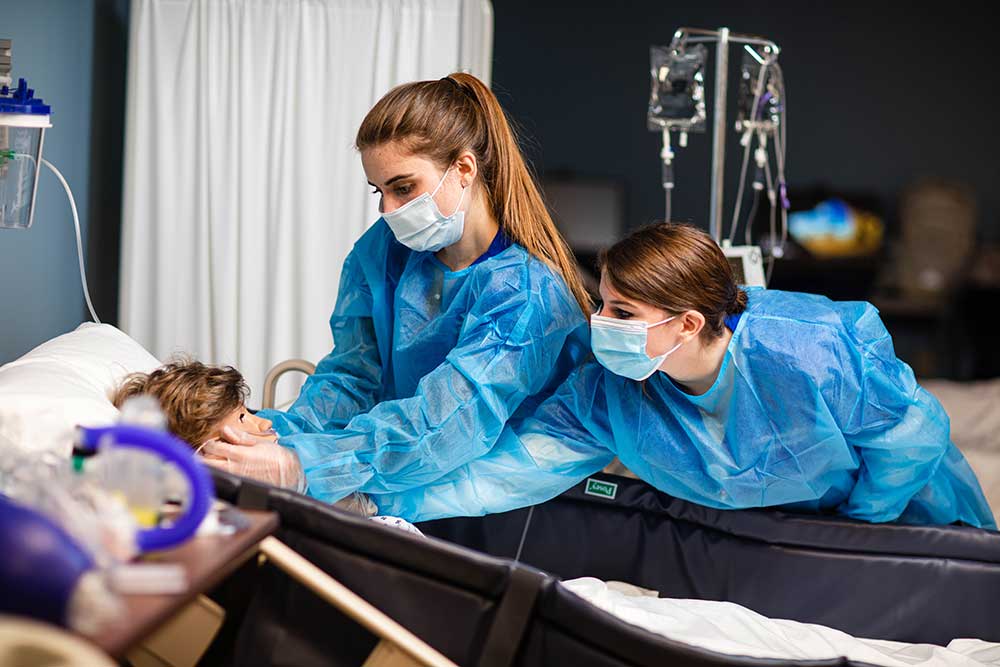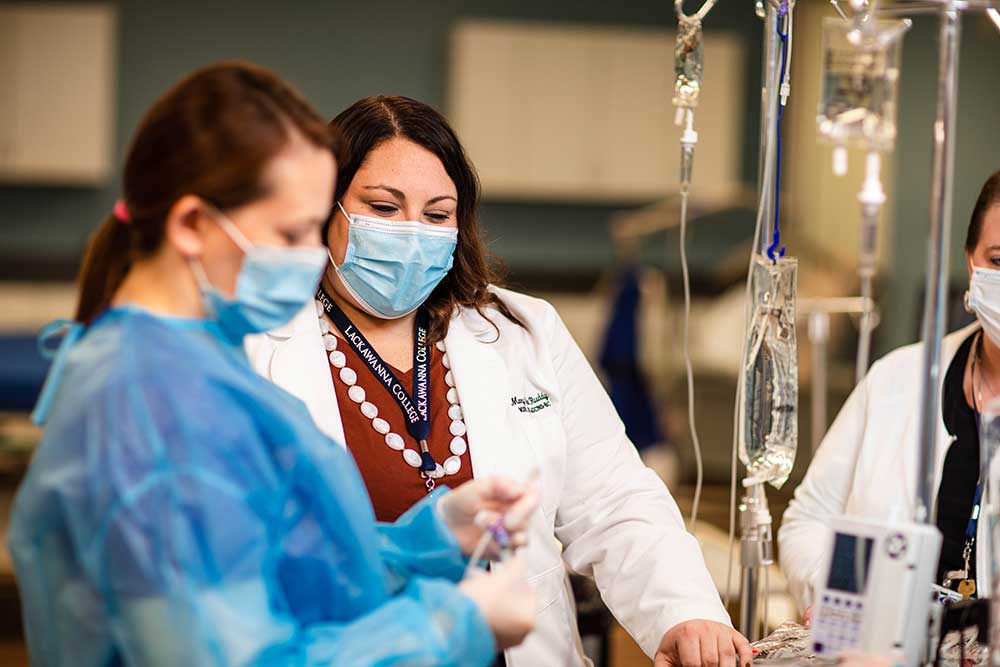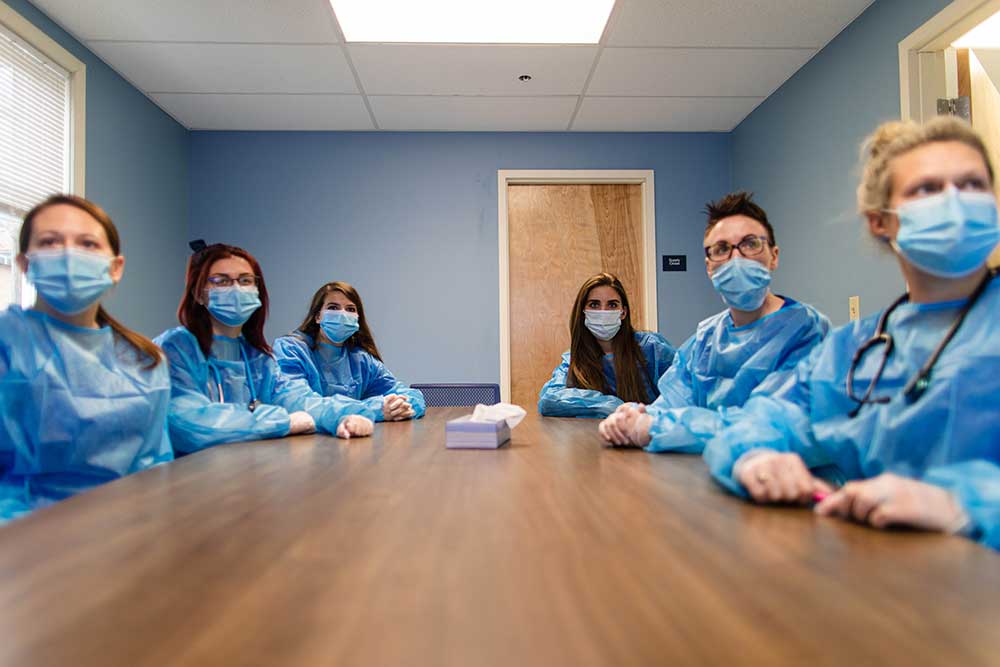
Nursing
At A Glance
Associate in Science degree program prepares students to enter the healthcare field as graduate nurses.
At the end of the program, students will be ready to take the National Council Licensure Examination-RN (NCLEX-RN).
The field is growing with job opportunities expected to increase by 25% from 2020 to 2030.
The media salary for nurses is $77,600, which depends on experience and industry.
Available at the Scranton campus.

Welcome to Nursing-Associate Degree
If you enjoy caring for sick people and being part of a medical team consider enrolling in Lackawanna College’s Nursing Associate of Science degree program. Lackawanna’s program prepares students for the demands and challenges they’ll experience as nurses.
Your Career Starts Here
If you enjoy caring for sick people and being part of a medical team consider enrolling in Lackawanna College’s Nursing Associate of Science degree program. Lackawanna’s program prepares students for the demands and challenges they’ll experience as nurses.

More About the Program
Nursing students will need to learn how they can apply their education to real-life situations. Lackawanna College’s state-of-the-art simulation lab will prepare students to make clinical judgments relating to various levels of stress in healthcare environments. Nursing students will be introduced to the simulation in their first semester and it will continue to be included in each nursing clinical course.
At the end of the program, students will be ready to take the National Council Licensure Examination-RN (NCLEX-RN).

The Course Work
The nursing curriculum combines classroom-based learning with laboratory and clinical experiences. Nursing can be a demanding field, and our program provides students with the skills and education they’ll need to serve their patients.
Students will gain a solid understanding of various health and science subjects, including:
- Biology
- Chemistry
- Anatomy
- Pharmacology
- Nursing care
Additional Information
Nursing Program Mission
The mission of the Lackawanna College ASN Nursing Program is to prepare a nursing graduate for immediate entrance into the nursing workforce who provides competent holistic nursing care to diverse populations, advocates and influences health promotion, effectively collaborates with other healthcare disciplines, and demonstrates professional and ethical behaviors in their engagement with patients, families and communities.
Nursing Program Core Values
The nursing core values essential to baccalaureate education include caring, integrity, accountability, social justice, and empowerment.
- Caring – encompassing compassion and concerns for others.
- Integrity – sustaining strong moral and ethical principles.
- Accountability – displaying a sense of obligation, intent, willingness, and ownership in nursing practice.
- Social Justice – performing fair treatment regardless of culture, age, disability, economic status, sexual orientation, and nationality.
- Empowerment – mobilizing and motivating oneself and others to achieve optimal goals.
These core values for the Lackawanna College ASN program are demonstrated in learning, practice, patient-education, and service-learning. The integration of the core values throughout the RN student’s educational experiences will be represented and strengthened for the imminent nursing workforce.
Nursing Program Philosophies and Objectives
The philosophy of the Associate in Science in Nursing Program holds certain beliefs that nursing education should be a vital component of Lackawanna College. The faculty agrees that the philosophy and objectives of Lackawanna College’s mission support the diverse educational necessities of the community. In reinforcing the objectives of Lackawanna College, the Associate in Science in Nursing prepares a nursing graduate for immediate entrance into the workforce and provides courses that may be acceptable for future advanced educational opportunities and academic development. The faculty believes that the uniqueness and complexity of humans relate to biological, sociological, communication, and psychological needs that vary during one’s life. Health for humans is defined as an individualistic process of well-being and a right for every individual. The interdisciplinary healthcare team should collaboratively provide a diverse array of health services for individuals. Every individual has the right to energetically partake in the decision-making process of one’s health with the interdisciplinary healthcare team. The faculty believes that nursing works independently and collaboratively with other healthcare disciplines to provide individualistic care and cost-effectiveness for all individuals. Nursing care should center on health promotion, illness prevention, and holistic care of those individuals who are ill, dying and disabled while supporting key roles of advocacy, education, and safety. The knowledge base of the Associate in Science Degree in Nursing is driven by the use of the nursing process to provide and coordinate nursing care for individuals who have simple, complex, and rehabilitative problems in various healthcare settings. A Nursing student uses their acquired knowledge base and skills to oversee and monitor the health status and management of expected and unexpected outcomes for individuals in various healthcare settings. The nursing faculty believes that a nursing student learns through a variety of avenues and comes into the Associate in Science in Nursing Program at different stages of development. Based on those beliefs, the learning process for the nursing student requires a multi-sensory approach to learning, the introduction of content from simple to complex, a composition of cognitive, affective, and psychomotor components, and acknowledging the nursing student’s life experiences and individualities.
Learning is ultimately the responsibility of the nursing student, as demonstrated in their energy, effort, and personal control of their learning activities. The faculty believes in sharing the responsibility of the nursing student’s learning to the extent of being accountable for curricular planning with the development and implementation of an effective learning environment.
Emphasis by the faculty will be in developing a nursing conscience that reflects professional, moral, legal, and ethical standards.
In synchronization with existing Lackawanna College continuing education opportunities and with community groups, the nursing faculty responds to learning needs by identifying, planning, and otherwise ensuring implementation of continuing education opportunities for the nursing student. As the healthcare needs of the community change, the faculty believes that a nursing student after graduation should acquire a professional obligation by engaging in continuing education opportunities. This belief is based on the continuing changing needs of the community.
The educational objectives of the Associate in Science in Nursing Program at Lackawanna College is to prepare the nursing student for successfully excelling with the NCLEX-RN and being able to perform within the scope of nursing as defined by the State of Pennsylvania Nursing Practice Act. The objectives of the Associate in Science in Nursing areas follows.
At the completion of the Associate in Science in Nursing Program, the student will be able to:
- Integrate knowledge obtained in basic sciences, humanities, social and psychological sciences as a foundation for academic pursuits.
- Demonstrate entry-level competencies of the professional nurse.
- Provide safe, effective, culturally responsive, and developmentally appropriate care to those entrusted to their care across the continuum of settings where nursing care takes place.
- Evaluate their professional behaviors through an ever-developing ethical lens while simultaneously incorporating legal duties and mandates of this Commonwealth.
- Utilize effective communication techniques when working with diverse patients, families, and other members of the interdisciplinary health care team.
- Demonstrate a commitment to the use of evidence-based practices in nursing science as a foundation for care using the nursing process and professional decision-making.
- Develop an appreciation for the changing nature of the professional nursing practice directed towards ongoing process improvement and innovation in patient care through emerging information systems and technologies.
- Embrace a commitment to lifelong learning and professional growth and development.
Nursing Program Goals
The goal of the Lackawanna College ASN Nursing Program is to prepare nursing students to contribute meaningfully to society through the practice of professional nursing aimed at relieving human suffering, providing competent nursing care, engaging in effective communication, demonstrating patient-education, and seeking educational advancement.
Nursing Program Pass Rates
Lackawanna College’s Associate of Science in Nursing Degree pass rate for first-time test takers of the National Council Licensure Examination (NCLEX) is 84.21%. The NCLEX is a nationwide examination for the licensing of nurses in the United States and Canada. According to the NCSBN, the 2022 national average pass rate for first-time test takers with an Associate Degree is 77.91%. Lackawanna College’s Nursing Program is pre-accredited by the National League for Nursing-CNEA and has full approval from the Pennsylvania State Board of Nursing. This is the most recent data available.
Application Forms
Nursing Program Application (PDF) ASN-Application-Form-Updated-June2022.pdf
Nursing Program Admissions Requirements (PDF) Admission Requirements 2023.pdf
Nursing Reference Form (PDF) Nursing Reference Form.pdf
Admissions Essay and Writing Sample Essay Rubric (PDF) Admissions Essay and Writing Sample Essay Rubric Updated (1).pdf
Important Links and Policies
Nursing Program Grading Policy (PDF) ASN Program Grading Policy For Website.pdf
Tuition & Fees Lackawanna’s Tuition & Fee Pricing | Lackawanna College
ASN Program Nursing Student Handbook 2023-2024 (PDF) ASN-Nursing-Student-Handbook-2023-2024.pdf
